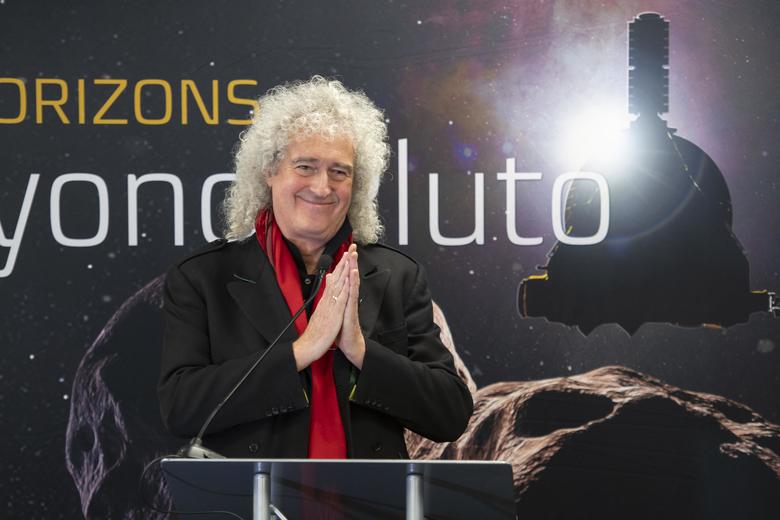chevron_left
-
play_arrow
NGradio So good... like you
Queen guitarist–slash-astrophysicist Brian May’s role in the New Horizons mission.
Brian May, guitarist for the band Queen, has a new gig these days.
As a member of the New Horizons team at NASA, which he joined in 2015, his name appears at the bottom of color images of a space rock called MU69 (also known as Ultima Thule), captured during a flyby on Tuesday. It’s the most remote object that’s ever been visited by a spacecraft and the oldest known relic of the early solar system, May explains on his Instagram, and it holds clues to our planetary system’s origin. “That same solar system that was born so that you and I could be born!” he writes. When viewed cross-eyed, May’s images provide a 3D view of the object, revealing its topography.
May is something of a 3D nerd. He has a whole website on stereoscopic photography and has a book called Queen in 3-D filled with pictures he took with a stereoscopic camera that he carried around during his time with the band.
He also released a single about the flyby and an accompanying music video. “This project made music in my head, and that’s what you’re hearing,” May told reporters, according to Space.com. The Queen-esque anthem is a worthy listen for taking a long trip, whether through space, on the road, or at work. “The fruits of wishful thinking, we taste them for real,” the song goes. “We’re off to new horizons, so hold onto the wheel.”
May completed an astrophysics Ph.D. in 2007, after a 30-year hiatus to pursue music. “When I was about to finish my thesis it was just the beginnings of Queen and I had to make that choice,” he told Time. “And my choice was made on the assumption that I wasn’t very good at physics and I might be quite good at music.” Like so many people who dip between science and art pursuits, May illustrates that the two aren’t mutually exclusive.
And like any songwriter, his work includes careful word choices. The subtitle of his latest song about MU69 refers to it by its NASA-given nickname, Ultima Thule (pronounced “thool-ie”). During the Roman Empire, the name referred to a cold and distant land—much like the space rock—but was later used by Nazis to refer to their fictional homeland, explains Meghan Bartels on Space.com.* She’s rightly questioned NASA for picking the term despite its racist history. Luckily, the song itself skips the nickname, though for another reason, May told reporters. He couldn’t find a suitable rhyme for it: “You think I’d make a fool-ie of myself?”
Source: slate.com
Written by: New Generation Radio
Rate it
ΔΗΜΟΦΙΛΗ ΑΡΘΡΑ
COPYRIGHT 2020. NGRADIO





















Post comments (0)